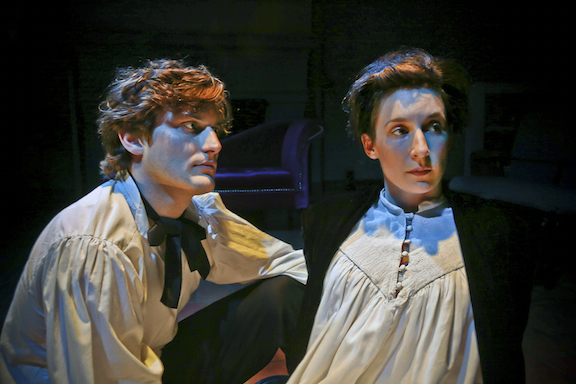
Remembering Ada
In a long and high-ceilinged room in the stately and charming Berkeley City Club on Durant, just south of the campus, Central Works presented yet another world premiere this past weekend. Ada and the Memory Engine, a new play by San Francisco–based playwright Lauren Gunderson, tells the story of Augusta Ada Lovelace.
Ada, as she is called, is the only legitimate daughter of the wildly restless poet, George Gordon, Lord Byron, a man of impetuous imaginings, prolific writing and revolutionary passions. He remains an icon of the Romantic era, just preceding and standing in opposition to the strictures of the Victorian age. He died in Greece in 1824, at the age of 36.
The offspring of Byron’s short-lived marriage, Ada has never met or even seen her father, but she is nonetheless tethered to his memory. Her mother directs the girl’s study toward mathematics and music in an attempt to squelch anything in Ada that might resemble her father’s passionate excesses. Nothing in the least poetical.
Bad idea. Or better said, an idea doomed.
For Ada has indeed inherited her father’s genius and vivid imagination. And although mathematics, with its abstracted formulas and stark symbols, may seem to contain no tendencies toward the fantastic, its very abstractness allows for a deep structural understanding of relationship in the world. Math cannot exist without imagination. Brilliant mathematics cannot exist without passion.
All this becomes inescapably clear when Ada meets Charles Babbage, mathematician, philosopher and inventor, at a dinner party. The 42-year-old Babbage describes to the 17-year-old Ada the invention he has been struggling to realize – the Analytical Engine. The first computer. The year is 1833.
Ada is enchanted.
Later, Babbage will call Ada the “Enchantress of Numbers” for her extensive work on programming and realizing the engine’s mathematical and mechanical system. There remains some question as to the extent of each individual’s contribution to the concept and mathematics of the Analytical Engine.
Gunderson, who has written several plays with scientific and historical themes, has done a terrific job transforming Ada’s story. Much of the story is told through excerpts from real letters written between the various players – Ada, Babbage, Ada’s disapproving and conventionally minded mother, and Lovelace, the man Ada marries. The texts are succinct and pithy, moving story and emotions along at the clip of an electronically infused calculation.
The cast does an equally terrific job. Kathryn Zdan enlivens Ada with all the necessary passion and vivacity, and Kevin Clarke plays an intelligent but stubborn Babbage, who will undermine all his good work through his public and political animosities.
They are supported by a solid and Byronically handsome Josh Schell who plays the dignified and appropriately congested Lovelace, and appears as the Man – a hallucinated version of Lord Byron, appearing to his child as she dies. And Jan Zvaifler, who plays the dual role (with a mere switch of dress, persona and wig) of Byron’s acerbic and abandoned wife and Mary Somerville, the Scottish scientist writer and mathematician who was Ada’s mentor.
Directed with skill and sense by Gary Graves, who also did the lighting, the play is ensconced tightly in a theater-in-the-round format: a solitary couch overlooked by a portrait of the young Queen Victoria make up the minimalist set.
The Kilbanes developed the music, which is skillful but often partakes of the 21st century more than the 19th, an intentional but somewhat distracting anachronism, especially in Ada’s swan song.
Most of the performances, which continue until November 22, are sold out, but waiting lists are held at centralworks.org. In any event, keep your eyes peeled for the work of this playwright and this excellent company now closing its 25th year.
– Jaime Robles
Photo: Josh Schell and Kathryn Zdan in Lauren Gunderson’s “Ada and the Memory Engine”. Photo by Jim Norrena
